Malcolm Gladwell MasterClass Review:
Is It The Best Course for Nonfiction Writers?
Last updated on: July 13, 2023, Written by:
Bill Tremlon
Just a heads up, whenever possible, I use affiliate links in my reviews to help cover the costs of running this site. You can learn more here.
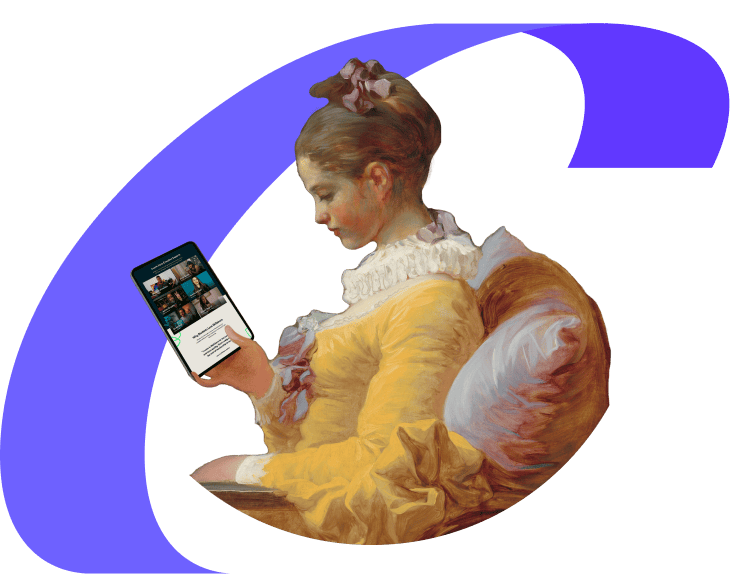
Everyone is a writer today. Whether it is emails, messages, articles, notes, or a book having a good writing style is a valuable skill. I’m convinced that writing nonfiction is the best way to improve how you write overall. That’s why I wrote the review of Malcolm Gladwell’s MasterClass and want to recommend it to anyone interested.
Read on to find out if his writing course is worth a MasterClass subscription in this Malcolm Gladwell MasterClass review. I will detail my experience reviewing Malcolm Gladwell’s writing MasterClass, covering the lessons, structure, engagement, pros, cons, and more.

Contents
Malcolm Gladwell MasterClass Outline
Malcolm Gladwell’s writing course stands out among the few nonfiction writing courses on MasterClass. Throughout the course, Malcolm tells his take on nonfiction writing, storytelling, and his interviewing process while sharing valuable insights into developing story ideas. There are numerous key takeaways from this MasterClass, making Malcolm’s course exceptional for those interested in becoming a better nonfiction writer.
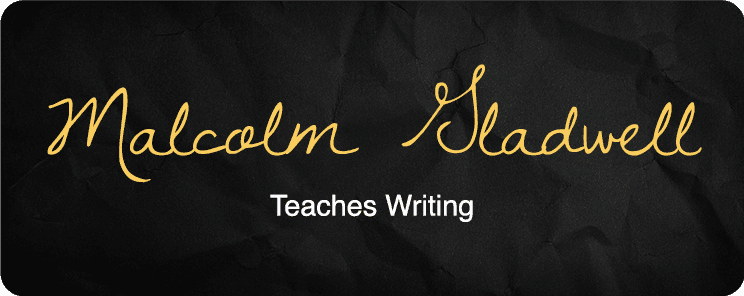
Malcolm Gladwell MasterClass Review In a Nutshell
| ⭐ Rating: | 8.8 ★★★★★ |
| 🥇 Category of class: | Writing |
| 📈 Suits best for: | Aspiring nonfiction writers and journalists |
| 🕒 Lenght: | 4 hours and 54 minutes |
| ⏳ Avg. Lesson Duration | 13-15 minutes |
| 🛍️ Course Essentials: | Notepad and love for nonfiction writing or journalism |
| 💼 Complementary material: | 76-page workbook with assignments |
| 📚 No. of Lessons: | 24 lessons |
| 🛒 Payment options: | Individual / Duo / Family |
| 💵 Price: | 10 – 20 $ (billed annually) |
| 🔄 Refund policy: | 30-day satisfaction guarantee |
| 🎁 Free trial: | ✅ |
Main Skills You’ll Learn
- Non-fiction and journalism writing;
- Structuring the narrative;
- Best practices for storytelling in non-fiction;
- Incorporating humor and melancholy;
- How to cultivate surprise to keep readers hooked;
- Conducting research and interviewing.
Is Malcolm Gladwell MasterClass For Me?
Malcolm Gladwell’s writing course is for those interested in nonfiction writing and journalism. Whether you need help writing better for literary journalism, essays, reviews, or any other type of nonfiction writing. His MasterClass aims to help his students become better writers overall, which is useful for everyday writers as well.
Our Evaluation
Total score: 8.8
PROS
CONS
In This Malcolm Gladwell’s MasterClass
Review, You’ll Learn
Malcolm Gladwell MasterClass Teacher Review
Meet Malcolm Gladwell
Malcolm Gladwell is a nonfiction writer with a background in journalism. He’s been a staff writer for The New Yorker since 1996. Gladwell had his breakthrough with the articles titled The Tipping Point and The Coolhunt. These articles also formed the basis for his first book, The Tipping Point: How Little Things Can Make a Big Difference.
Since The Tipping Point, Gladwell published another six books, covering a range of topics, from human behavior to social dynamics. He’s an acclaimed writer in both nonfiction and journalism with five New York Times bestsellers.
Malcolm Gladwell as a Teacher
Malcolm Gladwell teaches writing in a very detailed yet easy-to-understand manner. In his MasterClass, you will hear Malcolm Gladwell talk about various aspects of nonfiction writing while touching on interviewing and public speaking.
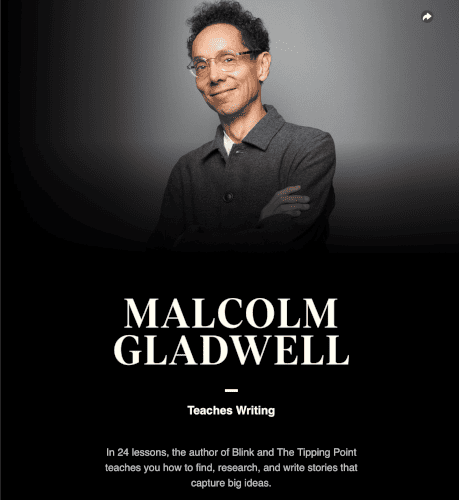
He begins his MasterClass saying he’s never done a course, which this Malcolm Gladwell Masterclass Review approves as I couldn’t find any on the internet.
About MasterClass
Since 2015, MasterClass brings 180+ online classes from top-tier instructors in almost any field. It includes pre-recorded video lessons from masters such as Richard Branson, Martin Scorsese, Aaron Sorkin, Gordon Ramsay, and many others.
The video quality equals Hollywood movies, and every course is carefully structured. MasterClass is worth it for skill development, providing community activities, and an ever-growing video library to enjoy. The sheer amount of content can make it hard to begin. Cursums will help you to choose wisely.
Originality and Novelity of the Content
There isn’t a course Gladwell was featured in the past, as that’s how he begins his MasterClass. If you wanted to learn writing from him, the only places you could turn to was Gladwell’s books, interviews, and articles.
Since these don’t provide a direct learning experience, that leaves MasterClass the only place you can learn from him. In his MasterClass, Gladwell talks about various aspects of writing nonfiction books and journalism, from writers block to capturing someone’s attention.
While all the lessons make Gladwell’s MasterClass a great course, the MasterClasses of other writers can provide just as much value. Some of the writers on platform include Shonda Rhimes MasterClass with the similar niche content. Alternatively, you can explore something completely different, such as getting writing advice from Neil Gaiman or learning writing style from Dan Brown. With an all-access pass, you can watch as many courses tailored to writers as you want on MasterClass.
Content and Structure of the Malcolm Gladwell MasterClass
Gladwell’s MasterClass is a little lengthy at 4 hours and 54 minutes. Malcolm teaches writing in 24 lessons with an average duration of 13-15 minutes. You can finish the entire course from start to finish in one sit, but that won’t be optimal. With the homework assignments from the 76-page workbook, it can take a few days to a week.
If you’re hurrying to finish his MasterClass, check my fast-track lesson plan to complete the course faster. It won’t be as comprehensive as finishing the entire thing, but you won’t miss much out on the key points.
Getting the Audience’s Reaction
1-4 Lessons Summary
Malcolm Gladwell’s MasterClass starts with what will be featured in his non-fiction writing class. He steps into structuring the narrative, comparing it to solving jigsaw puzzles. This chapter is on how to write a narrative and holding readers.
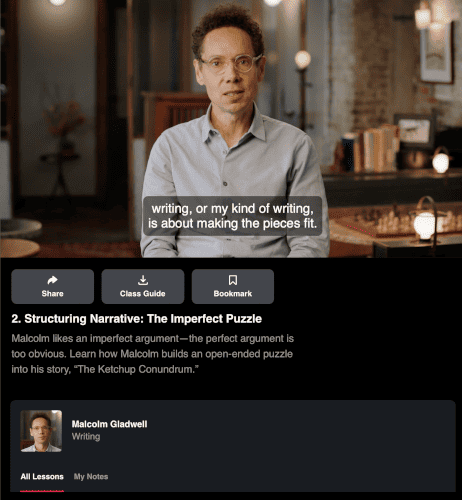
Malcolm shares his tools for engagement and ways to keep the audience’s attention by controlling information to invite the reader to make them guess. He teaches withholding information until the end to encourage readers to further reading. Malcolm also touches on adding suspense, a crucial aspect of storytelling.
This chapter was interesting as Malcolm explains various aspects to keep readers engaged and leave them guessing until the end. It’s an excellent beginning to the course, with great advice on capturing the audience.
Story Development
5-9 Lessons Summary
In this chapter, Gladwell shares his methods for doing research. Namely, with an open mind and promoting utilizing various means of research. Malcolm also recommends conducting research off the internet and encourages following your curiosity.
The following lesson covers Gladwell’s criteria for what makes a story idea worth pursuing. When finishing this part, he advises writers not to write in the first person, and Malcolm shows why it’s not a good idea.
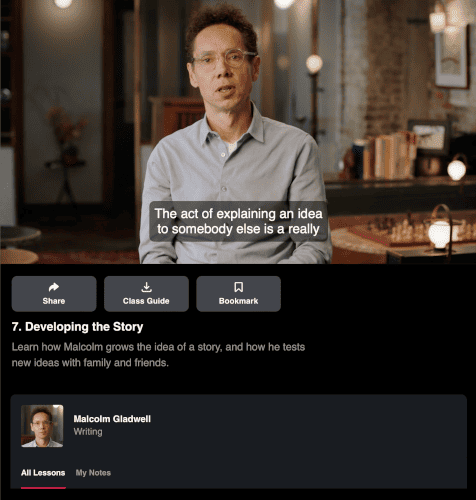
Malcolm takes his teaching from the past lesson to developing stories. He begins these two lessons about story development with how you can further test an idea to grow it. He gives practical advice to writers before ending the Developing the Story lessons with two case studies from David and Goliath to What the Dog Saw.
In the last lesson, Malcolm shares his tips on interviewing subjects and ends the chapter by teaching about what troubles him during the interview process.
Writing Characters
10-12 Lessons Summary
Lessons 10 through 12 are all about writing and developing characters. Together with the creative writing courses I finished on MasterClass, these courses can have taught me a lot.
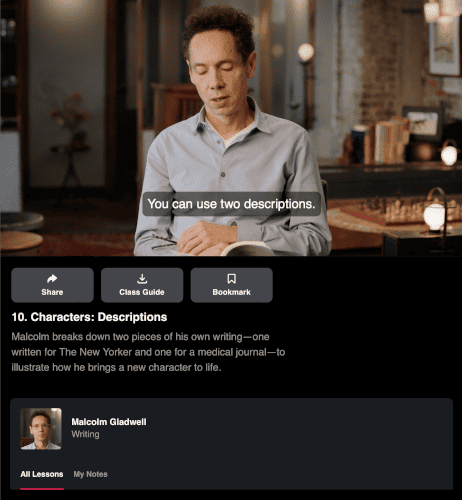
Malcolm starts explaining it takes more than good writing to write appealing character descriptions. He finishes the second lesson by describing a character’s world and advises writers to practice describing characters through their settings.
This section of Malcolm Gladwell’s MasterClass ends with a character case study of The Pitchman. It’s a profile Gladwell wrote about Ron Popeil, a creator and a salesman of kitchen gadgets.
Writing the Story
13-17 Lessons Summary
This was my favorite part of Gladwell’s MasterClass by far for a variety of reasons. Gladwell explains different aspects of his writing style and the essentials nonfiction writers should follow.
Malcolm touches on sentence length and punctuation and how he uses them to create a rhythm. He then talks about the use of jargon in non-fiction writing and how you can use them to hook readers.
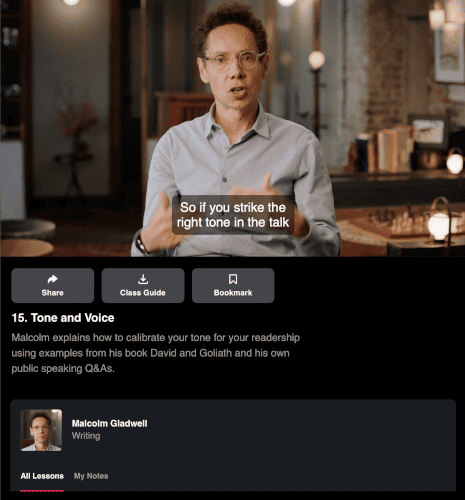
Malcolm then talks about calibrating tone and gives plenty of examples from his public speaking Q&As while comparing the way you write and the way you speak.
This prepares the next lesson: Humor and Melancholy. Malcolm shares interesting points between sadness and laughter in writing non-fiction and setting and managing reader expectations. The chapter ends with a case study of his own work, Something Borrowed from The New Yorker.
Editing, Polishing, and Publishing
17-20 Lessons Summary
Malcolm Gladwell’s Masterclass covers editing, polishing, and publishing like a crash course. It’s very detailed, and I recommend aspiring columnists to listen carefully.
Malcolm Gladwell starts with the importance of reading your titles and how they grab attention. He thinks titles are similar to advertisements. The following lesson covers setting achievable goals to prevent disappointment, writing as you research, and writer’s block.
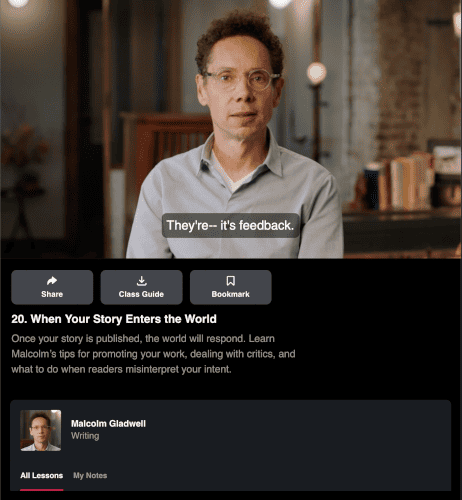
The last lesson covers ways to promote your book after publishing and learning from the reviews. He ends with Gladwell advising writers not to mistake critics for their readers. You should write for those who will be reading your work the most.
Recommendations and Closing
21-24 Lessons Summary
The last four lessons are more or less about life as a writer and Malcolm’s career advice to writers. He talks about launching a career as an aspiring writer and encourages upcoming writers to get a job that supports their passion.

I particularly enjoyed his advice on how and what to read. As an avid reader, I found these two lessons fun to watch and satisfied my curiosity about what he likes to read. Gladwell ends his MasterClass by summarizing nonfiction writing and compares writing to other art forms that require creativity.
Fast-Track Lesson Plan
Finish Malcolm Gladwell’s MasterClass in 3 hours, 10 minutes, and 3 seconds.
| No. | Lesson | Duration |
| 3. | Holding Readers: Tools for Engagement | 13:40 |
| 4. | Holding Readers: Controlling Information | 13:23 |
| 6. | Selecting the Story | 12:34 |
| 7. | Developing the Story | 12:37 |
| 9. | Interviewing | 15:27 |
| 10. | Characters: Descriptions | 09:48 |
| 11. | Characters: World Building | 10:09 |
| 13. | Structuring Language | 09:55 |
| 15. | Tone and Voice | 17:01 |
| 16. | Humor and Melancholy | 09:43 |
| 18. | Titles | 08:28 |
| 19. | Drafts and Revisions | 20:18 |
| 20. | When Your Story Enters the World | 07:23 |
| 21. | Working as a Writer | 08:20 |
| 22. | How to Read | 13:30 |
| 24. | Conclusion: A Theory of Other Minds | 07:46 |
Engagement and Retention of Malcolm Gladwell MasterClass
It should be already clear from this Malcolm Gladwell’s MasterClass review that he’s a very engaging teacher. It adds to the enjoyment of this practical online writing course and makes it fun while you learn ways to become a better writer.
Since it’s a writing MasterClass, you won’t find it very visually appealing. However, Malcolm’s anecdotes and examples make it a fun course to watch.
The assignments are also engaging and encourage you to go beyond just writing. The class project guide will ask you to visit Wikipedia to find article ideas, analyze public speakers, and more. All these assignments complement Malcolm’s teaching style.
My Firsthand Experience With Malcolm Gladwell MasterClass
What I liked About Malcolm Gladwell MasterClass
Teachings beyond writing nonfiction
Malcolm Gladwell teaches more than writing in his MasterClass. The lessons touch on conducting proper research, interviewing subjects, grammar, life as a writer, reading tips, and more.
A structured class
Malcolm’s MasterClass has a strategic structure. It starts with the essentials of nonfiction writing before diving deep into his writing tips. The course then covers editing and publishing while giving tips on working as a writer.
Reinforcements throughout the course
Malcolm gives plenty of anecdotes to reinforce his teaching. You will hear him tell a short story and share examples from his books to help you understand a topic.
Reader-focused lessons
There are lessons on engagement, capturing the attention of the reader, and titles – all of which are all about the reader. What made this MasterClass exceptional for me was Malcolm’s points on hooking a reader to encourage them to read more of your work.
What I Didn’t Like about Malcolm Gladwell MasterClass
Too many anecdotes
Although Malcolm’s anecdotes keep the topics interesting and reinforce them, they can be too much. Even though I never skipped a particular part, you may not want to listen to the anecdotes and stories, especially if you already understood what he was teaching.
Length of the course
Gladwell’s course is quite long, at almost 5 hours. Compared to other writing courses, Billy Collin’s poetry writing course, for example, it’s among the lengthiest MasterClass courses. If you find the course length overwhelming, look at my fast-track lesson plan.
Is Malcolm Gladwell MasterClass a Good Purchase?
Price of Malcolm Gladwell MasterClass
The price of Malcolm Gladwell’s MasterClass is nothing comparable to the value you get as a writer. At as little as $10 a month for the annual plan, Gladwell’s course is definitely worth a MasterClass subscription. Moreover, if you’re considering a thoughtful gift for an aspiring writer, a MasterClass gift certificate that includes access to courses like Malcolm Gladwell’s, Neil Gaiman’s and, James Paterson’s can be an excellent choice.
Also, you can reach out to the MasterClass team to request a full refund within 30 days of your purchase, making it a risk-free investment.
| Plan | Price |
| Individual (one device) | $10 per month |
| Duo (two devices) | $15 per month |
| Family (six devices) | $20 per month |
Does the Class Live Up to the Hype?
I found Malcolm Gladwell’s MasterClass to fulfill its promises. Malcolm Gladwell teaches writing while touching on the essentials every nonfiction writer (if you’re looking to learn fiction writing, I recommend checking Margaret Atwood’s MasterClass review). This made his writing class exceed my expectations, as I initially thought the class’ purpose was to write like Gladwell.
Malcolm Gladwell’s MasterClass goes beyond writing with lessons on interviewing, research, reading tips, and more. It lives up to the hype and delivers more than most of my reviewed MasterClass content.
Malcolm Gladwell MasterClass: Ratings from Around the Web
A Twitter user mentioned his MasterClass in Malcolm Gladwell’s tweet about his book, The Bomber Mafia.

Here’s a Facebook commentator sharing his thoughts on Gladwell’s MasterClass and appreciating the online learning platform.

A Reddit user listed Malcolm Gladwell’s MasterClass as one of their favorites even before finishing it while recommending Matthew Walker’s MasterClass.

“Matthew Walker for sleep and i’m almost finished Malcom Gladwell’s for writing. Both are very engaged speakers”
Essentials Used in the Malcolm Gladwell MasterClass
You won’t need any items before starting Gladwell’s MasterClass. You only need to take notes, which you can do through the online learning platform. MasterClass has a section next to All Lessons, where you can save notes for individual lessons.
As long as you’re willing to learn what Gladwell teaches in his online class, you’re all set. However, I highly recommend reading some of his books:
- The Tipping Point: How Little Things Can Make a Big Difference (2002)
- Blink: The Power of Thinking Without Thinking (2005)
- Outliers: The Story of Success (2008)
- David and Goliath: Underdogs, Misfits, and the Art of Battling (2015)
- Talking to Strangers: What We Should Know About the People We Don’t Know 2019
Courses Similar to Malcolm Gladwell’s MasterClass
Other Courses of Writing Courses on MasterClass
- Neil Gaiman on The Art of Storytelling
- Amanda Gorman on Poetry
- Billy Collins on Reading and Writing Poetry
- Joyce Carol Oates on The Art of the Short Story
- Margaret Atwood on Creative Writing
- Dan Brown on Thriller Writing
- David Sedaris On Storytelling and Humor
- James Patterson on Writing
- Salman Rushdie on Storytelling and Writing
- Walter Mosley on Fiction and Storytelling
MasterClass Competitors
Udemy
Udemy is one of the most popular online learning providers, with a massive choice of writing classes. I recommend looking into Udemy’s Creative Writing Masterclass is a great practical guide on writers’ motivations, grammar, style, publishing, and more.
Coursera
Coursera is another big name in the online courses market, with quite a few on writing. Their Creative Writing Specialization delivered by professors from Wesleyan University even includes a certificate of completion.
Skillshare
Skillshare usually focuses on more practical courses, but their Storytelling 101 course is really compelling and conveniently breaks down storytelling into “4 C’s”. The material is as enjoyable as it is useful.
Malcolm Gladwell MasterClass: FAQ

Blogger | Life-long learner
Bill Tremlon
I’ve spent the last ten years passionately studying various online learning platforms. Udemy, MasterClass, Coursera, and Skillshare are the main ones, but I review lesser-known study tools as well. I test and analyze each course and lesson thoroughly before sharing my research.

Blogger | Life-long learner
Bill Tremlon